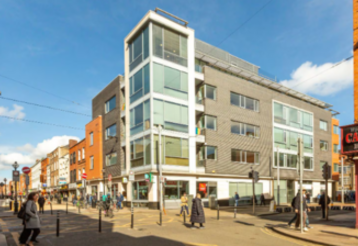Members
Afresh's Tips for Workers

Workplace wellbeing day is 31st March We spend at least 30% of our lives working. However, changing lifestyles and technology mean that we are now beginning to spend more time than ever actually mentally tuned into work. This means our personal and work lives often merge. In tandem with this, Ireland is set to become the most obese country in Europe according to a study published by The Lancet. These factors pose serious challenges to our general health. It is therefore now more appropriate than ever to promote workplace wellbeing. So to celebrate the 31st March, Ireland’s third annual workplace wellbeing day, here’s a couple of practical tips you can take to be well at work.
Our top 10 tips for workplace wellbeing
Stand up
Stand up when answering the phone. Stand up when a colleague approaches. Stand up to stretch. If you have a sit standing desk, use it.
Sitting Disease is the scourge of the modern office and was recognised as such by the American Medical Association’s AGM in 2013. There is a growing body of research, the largest one by the University of Wisconsin in 2012 , which shows that long periods of sitting down raises our risk of developing heart disease, diabetes, cancer, and obesity. Simply standing up regularly helps manage these risks. So try and stand up at least every hour.
Step up
Use that free exercise machine called the stairs in your office. Try a walking meeting. Park the far end of the car park. Get off the train or bus a stop earlier.
Official guidelines recommend that the average adult should get 150 minutes of moderate aerobic activity or 75 minutes of vigorous aerobic activity a week, or a combination of both. The important thing to remember is that doing something is better than doing nothing. It all adds up and doesn’t need to be done in one go – 10 minutes here, 10 minutes there, 10 minutes anywhere – just get stepping!
Get your heartbeat going
Find something you enjoy doing which raises your pulse for 20 minutes. Build it into your routine. Set yourself a goal – whether it be a mini marathon, hike or bike ride!
Exercise is one of the best pills for all ills. A 2014 Harvard Business Case Review has shown that employees who take exercise during the working day are also more productive than those who don’t. So if you want to feel better and get more done during the working day, try a 20 minute run or cycle at lunch time!
Take a break
Build short quality breaks into your day which allow your mind recharge. Chat to a colleague. Daydream for a few minutes. Switch off completely to switch back on fully!
Our bodies work in “ultradian cycles” of 90 to 120 minutes during which we move from high energy concentration levels into a physiological trough. Towards the end of each cycle, we experience restlessness, lack of focus and crave a break. However, taking breaks is counterintuitive in many organisations’ cultures and many of us continue to work through the trough, further depleting our energy and focus. Yet to break frequently results in higher and more sustainable performance. It is possible to regain peak productivity in a few minutes once we completely disengage from work and completely switch off. So remember, short quality breaks every 90 minutes can in fact make us more productive.

Eat. Away from your desk!
Eat wholesome, healthy fresh food and snacks every 3 to 4 hours. Bring in a lunch box. Know how to choose wisely.
To fully appreciate our food and digest its goodness, we should pay attention to what we eat. Chomping mindlessly through a sandwich, trying to clear emails does not help this. If under pressure, try and take even ten minutes out to eat your food away from your desk or at least away from your work activities. It will do both body and mind good!
Drink Water
Keep a water bottle on your desk. Try the odd herbal tea. Have a glass of water with each cup of tea or coffee you drink.
A recent study from the University of Connecticut Human Performance Laboratory found that even mild dehydration of 1.5 % alters a person’s mood, energy levels and mental function. It affects concentration and our ability to think clearly and manage mood. Drinking water also helps remove toxins from our bodies. Thirst pangs are often mistaken for hunger pangs. So, to manage weight, energy and concentration build drinking water into your daily routine.
Manage technology to maximize productivity and minimize stress
Allocate specific times for emails. Know when to switch off your smart phone. Ensure notifications are not an unnecessary distraction.
Whilst emails, instant messaging and mobile phones can make us more productive, if not managed correctly they can be sources of stress and cause us to be less efficient. The average smart phone user reaches for their phone 150 times a day. It takes 68 seconds to re-focus after every email notification we register; and that is without even dealing with it. So, manage technology rather than have technology manage you!
Breathe!
Develop a healthy breathing routine: take a few deep breaths before your coffee break; before a meeting: before answering the phone.
80% of us hold our breaths when we look at emails. Whilst that may seem amusing it does not help manage our stress levels. Breathing deeply circulates oxygen through our body which helps keep us calm, focused and energized! So take time to check your breathing and learn to breathe deeply!
Do something worthwhile
Get involved in a good cause at work. Volunteer your time. Help your colleagues.
We feel better about ourselves if we do something which we think is worthwhile. If our day to day work activities do not give us this sense of fulfilment, then see how else we can find satisfaction at work. It may be by helping colleagues, becoming involved in the Corporate Social Responsibility programmes or simply volunteering useful suggestions. Helping others gives us what is known as “helpers high”!
Show appreciation
Say thanks to a colleague. Smile. Appreciate the small wins every day!
Research shows we can promote our own wellbeing by taking time to appreciate what we have and show gratitude to others. If we are not motivated by our jobs or are encountering challenges showing appreciation can be easier said than done. However, why not try smiling or saying a simple thank you and see how better it makes you feel.
Source: www.afresh.ie


